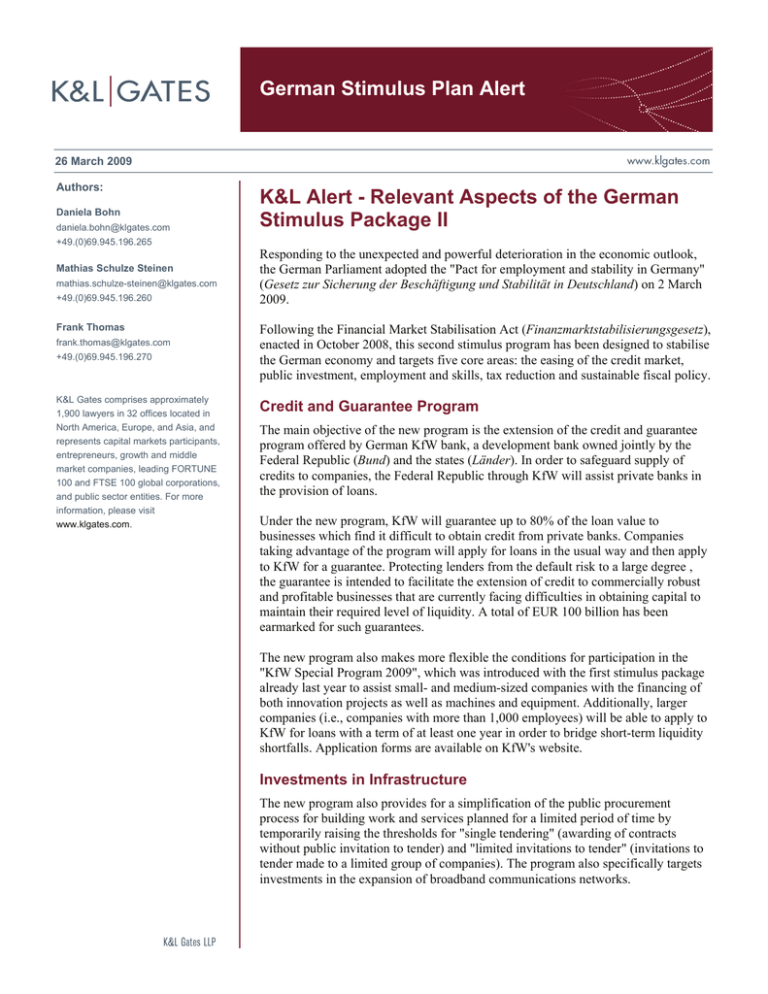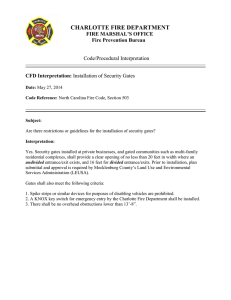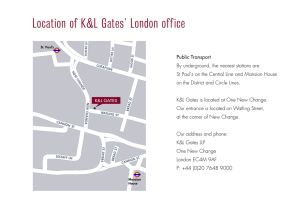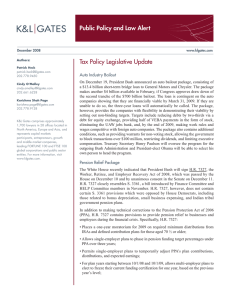
German Stimulus Plan Alert
26 March 2009
Authors:
Daniela Bohn
daniela.bohn@klgates.com
+49.(0)69.945.196.265
Mathias Schulze Steinen
mathias.schulze-steinen@klgates.com
+49.(0)69.945.196.260
Frank Thomas
frank.thomas@klgates.com
+49.(0)69.945.196.270
K&L Gates comprises approximately
1,900 lawyers in 32 offices located in
North America, Europe, and Asia, and
represents capital markets participants,
entrepreneurs, growth and middle
market companies, leading FORTUNE
100 and FTSE 100 global corporations,
and public sector entities. For more
information, please visit
www.klgates.com.
K&L Alert - Relevant Aspects of the German
Stimulus Package II
Responding to the unexpected and powerful deterioration in the economic outlook,
the German Parliament adopted the "Pact for employment and stability in Germany"
(Gesetz zur Sicherung der Beschäftigung und Stabilität in Deutschland) on 2 March
2009.
Following the Financial Market Stabilisation Act (Finanzmarktstabilisierungsgesetz),
enacted in October 2008, this second stimulus program has been designed to stabilise
the German economy and targets five core areas: the easing of the credit market,
public investment, employment and skills, tax reduction and sustainable fiscal policy.
Credit and Guarantee Program
The main objective of the new program is the extension of the credit and guarantee
program offered by German KfW bank, a development bank owned jointly by the
Federal Republic (Bund) and the states (Länder). In order to safeguard supply of
credits to companies, the Federal Republic through KfW will assist private banks in
the provision of loans.
Under the new program, KfW will guarantee up to 80% of the loan value to
businesses which find it difficult to obtain credit from private banks. Companies
taking advantage of the program will apply for loans in the usual way and then apply
to KfW for a guarantee. Protecting lenders from the default risk to a large degree ,
the guarantee is intended to facilitate the extension of credit to commercially robust
and profitable businesses that are currently facing difficulties in obtaining capital to
maintain their required level of liquidity. A total of EUR 100 billion has been
earmarked for such guarantees.
The new program also makes more flexible the conditions for participation in the
"KfW Special Program 2009", which was introduced with the first stimulus package
already last year to assist small- and medium-sized companies with the financing of
both innovation projects as well as machines and equipment. Additionally, larger
companies (i.e., companies with more than 1,000 employees) will be able to apply to
KfW for loans with a term of at least one year in order to bridge short-term liquidity
shortfalls. Application forms are available on KfW's website.
Investments in Infrastructure
The new program also provides for a simplification of the public procurement
process for building work and services planned for a limited period of time by
temporarily raising the thresholds for "single tendering" (awarding of contracts
without public invitation to tender) and "limited invitations to tender" (invitations to
tender made to a limited group of companies). The program also specifically targets
investments in the expansion of broadband communications networks.
German Stimulus Plan Alert
The new program also intends to encourage car
sales by extending the already ubiquitous „ecopremium“ (Ökoprämie) to the exchange of older
cars for new ones (Abwackprämie).
months. Companies shall use this short-time work
to invest in the qualification of their workforce and
will receive subsidies for advanced training and
education of their employees.
Safeguard Jobs
Other measures in the new program focus on
providing relief to private households and
increasing consumer demand intending to boost the
German economy.
To safeguard jobs and avoid discharge of workforce,
the new program facilitates the possibility of socalled „short-time“ work (Kurzarbeit). Short-time
compensation for such work will be paid by the
Federal Employment Office for a period of up to 18
K&L Gates comprises multiple affiliated partnerships: a limited liability partnership with the full name K&L Gates LLP qualified in Delaware and
maintaining offices throughout the U.S., in Berlin and Frankfurt, Germany, in Beijing (K&L Gates LLP Beijing Representative Office), in Singapore
(K&L Gates LLP Singapore Representative Office), and in Shanghai (K&L Gates LLP Shanghai Representative Office); a limited liability partnership
(also named K&L Gates LLP) incorporated in England and maintaining our London and Paris offices; a Taiwan general partnership (K&L Gates)
which practices from our Taipei office; and a Hong Kong general partnership (K&L Gates, Solicitors) which practices from our Hong Kong office.
K&L Gates maintains appropriate registrations in the jurisdictions in which its offices are located. A list of the partners in each entity is available for
inspection at any K&L Gates office.
This publication is for informational purposes and does not contain or convey legal advice. The information herein should not be used or relied upon
in regard to any particular facts or circumstances without first consulting a lawyer.
©2009 K&L Gates LLP. All Rights Reserved.
26 March 2009
2







